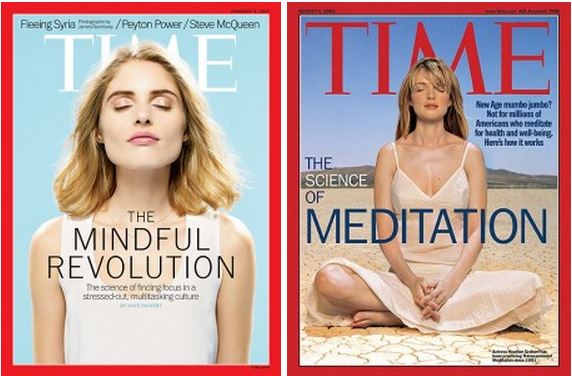The Seduction of Meditation In Pop Culture and Mainstream Media
TIME magazine’s 2 Feb 2014 cover (above, left) announces the arrival of the “Mindful Revolution.” The publication joins a flurry of recent examples confirming that a shift is taking place in the representation of meditation in American popular media (Salguero).
Thinking Differently About Meditation
A mindful revolution would be a good thing. To some degree. Mainstream media, including TIME magazine, headlines shout that meditation is a revolution for “finding peace in a stressed-out, digitally dependent culture [and] may just be a matter of thinking differently”. I have no doubt we benefit by turning off our digital devices once in awhile, by tuning out the ceaseless chatter of our virtual realities, and by simply reconnecting with the Natural world as our forefathers and foremothers did. Great Grandpa John knew the essence of meditation, without knowing that he did, when he drove his horse drawn buggy to market. Perhaps a growing number of people are looking to meditation as a cure to their overly pixelated digitized lives?
The mystique and sexiness of meditation is overrated. Please don’t misread any of my words and think I’m saying there’s no benefits to meditating. I ‘m a fan of meditation, but not for the reasons most people are. As long as we also cultivate our reason and critical thinking skills meditation can be beneficial. You may argue that it’s too much thinking that’s our problem? No it’s not. It’s what we think or don’t think that’s our problem. Thinking and reasoning is a skill and method that can used constructively or destructively. There’s no magic bullet, no mystical link to our health and well-being.
Meditation Is NOT Science
The popular, mindless belief that meditation is some magical “science” is absurd. Calling meditation a science is totally misleading. Do we call sleeping science? Playing chess science? Praying science? Why meditation? I know ancient yogis and mystics developed a system. And, I studied and practiced meditation intensely for 14 years while I was a monk. But that “system” is a morass of superstitious beliefs and fantastic claims of supernatural energies and mystical powers. Pull back the curtains on that supernatural system of meditation and we see similar benefits as other human endeavors: relaxation, mental discipline, sensory deprivation, and thought/feeling exploration. Perhaps there’s some mysterious discovery to be found in meditation. Maybe. I’ll suspend judgement until there’s convincing evidence to warrant belief.
We can get relaxation, well-being, and peace from many activities but we don’t call them “science”. The use of the word science with meditation or anything non-scientific is a marketing gimmick. Spin! It sells magazines, it sells subscriptions to yoga lessons, and buys Mercedes for New Age gurus. Like most tools, meditation can be used for something constructive or to whack you over the head. When you get bombarded by pop media with faddish claims it’s time to exercise your skeptical- and critical-thinking skills.
Examining Meditation in Popular American Media
C. Pierce Salguero, for American Buddhist Perspective, writes “This is not the first time that meditation has been featured by TIME—a strikingly similar cover was published on 4 Aug 2003 (above TIME cover, right). Compared to the 2014 cover, the earlier one is transitional. The photograph of a white, attractive, blonde woman in her thirties is a none-too-subtle argument that meditation should be considered part of the American mainstream. But, if we pay attention to the words, we see that this cover takes a defensive posture. We are told that meditation has links with “health,” “well-being,” and “science.” However, meditation’s close associations with the 70s counterculture and Asian Buddhist teachers still linger, and TIME must work to distance itself from such “New Age mumbo-jumbo.””
Read Salguero’s American Buddhist Perspective Translating Meditation in Popular American Media.
